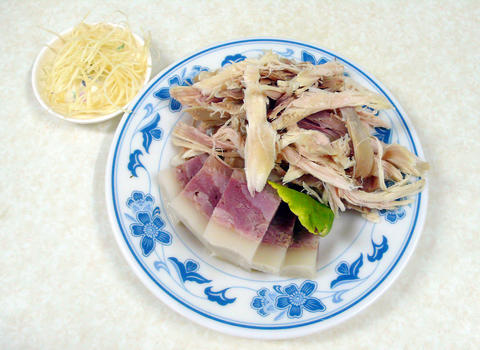In a quiet alley behind Taipei City Hospital, Heping branch (台北市立聯合醫院和平分院) lies an inconspicuous restaurant known to all food connoisseurs. Outside the traditional establishment, diners - drawn to its praise-worthy Yangzhou cuisine and bargain prices - stand in long lines every day.
The presence of gray-haired Chinese and government officials testifies to the authenticity of the food. For those who are still in doubt, a mouthful of the restaurant's famed cold appetizers - dried shredded chicken with brawn jelly and cabbage salad - will earn Chuan Yang Yu Fang a spot on the "return to" list. The former dish consists of ginger slices and Zhenjiang vinegar while the later is an appetizing plate with peanuts and cilantro seasoned with soy sauce, vinegar and spicy oil.
The joint's specialties look plain, but exceed expectations. The shredded dried tofu (NT$160) with shredded chicken, ham and spring onion in a soy bean and vinegar sauce and stewed noodles that come in different flavors, all surpass expectations.

PHOTO: HO YI, TAIPEI TIMES
Not ordering the juicy stewed lion's head meatballs - served in a bowl of cabbage-based soup - would be a big mistake. However, other popular seafood options include the fried codfish roll (NT$220) and pan fried eels (NT$370), a savory dish that goes well with spirits or beer.
The signature steamed dumplings and glutinous rice shaomai are also not to be missed. Ordering a dumpling assortment (NT$100) allows you to sample different varieties.
The red bean paste pancakes (NT$100) deserve a special mention as the creamy-tasting dessert scores high on many reviews.
If the extensive Chinese-only menu seems perplexing, ask the owner for suggestions. He always has his hands full, but is willing to help out.
Reservations are a must, and even ordering ahead is advisable as a number of signature dishes require two days of preparation. Last words of advise: remember to bring your own chopsticks to save the environment as the store only offers disposables.

President William Lai (賴清德) yesterday delivered an address marking the first anniversary of his presidency. In the speech, Lai affirmed Taiwan’s global role in technology, trade and security. He announced economic and national security initiatives, and emphasized democratic values and cross-party cooperation. The following is the full text of his speech: Yesterday, outside of Beida Elementary School in New Taipei City’s Sanxia District (三峽), there was a major traffic accident that, sadly, claimed several lives and resulted in multiple injuries. The Executive Yuan immediately formed a task force, and last night I personally visited the victims in hospital. Central government agencies and the

Australia’s ABC last week published a piece on the recall campaign. The article emphasized the divisions in Taiwanese society and blamed the recall for worsening them. It quotes a supporter of the Taiwan People’s Party (TPP) as saying “I’m 43 years old, born and raised here, and I’ve never seen the country this divided in my entire life.” Apparently, as an adult, she slept through the post-election violence in 2000 and 2004 by the Chinese Nationalist Party (KMT), the veiled coup threats by the military when Chen Shui-bian (陳水扁) became president, the 2006 Red Shirt protests against him ginned up by

As with most of northern Thailand’s Chinese Nationalist Party (KMT) settlements, the village of Arunothai was only given a Thai name once the Thai government began in the 1970s to assert control over the border region and initiate a decades-long process of political integration. The village’s original name, bestowed by its Yunnanese founders when they first settled the valley in the late 1960s, was a Chinese name, Dagudi (大谷地), which literally translates as “a place for threshing rice.” At that time, these village founders did not know how permanent their settlement would be. Most of Arunothai’s first generation were soldiers

Among Thailand’s Chinese Nationalist Party (KMT) villages, a certain rivalry exists between Arunothai, the largest of these villages, and Mae Salong, which is currently the most prosperous. Historically, the rivalry stems from a split in KMT military factions in the early 1960s, which divided command and opium territories after Chiang Kai-shek (蔣介石) cut off open support in 1961 due to international pressure (see part two, “The KMT opium lords of the Golden Triangle,” on May 20). But today this rivalry manifests as a different kind of split, with Arunothai leading a pro-China faction and Mae Salong staunchly aligned to Taiwan.